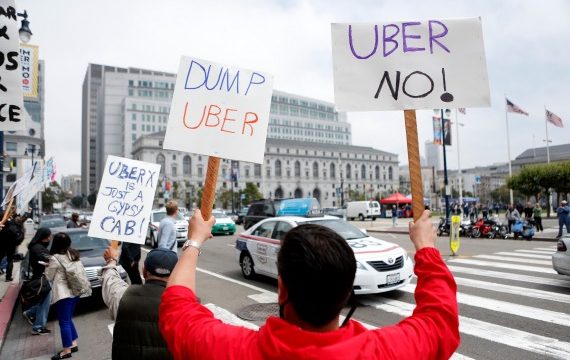Austin Protects SXSW Attendees From Cheap, Efficient Uber Rides

Uber, for those of you who haven’t tried the service, is a fantastic innovation in transportation. The company, now owned by Google, allows you to use a smart phone app to order transportation to wherever you’re at in available cities. You can get a quote on how much your ride will cost before you order. You can choose from among multiple levels of service, everything from cheap rides in small, fuel-efficient cards to luxury SUV’s. And once you order the ride, you can see exactly how long it will take your rider to reach you, even tracking them on the map.
You don’t even have to pay the driver. Your transaction takes place online, by way of your credit card, and you get an emailed receipt after the fact. I’ve used the service several times – in Dallas, Washington DC and Minneapolis – and it works fantastically.
But the company is often under fire. Congestion pricing – prices that go up when there’s heavy traffic or bad weather – has prompted accusations of price gouging. And in many areas Uber isn’t even allowed. Case in point, Austin, Texas, which is hosting the SXSW convention. Tech-savvy attendees who want to use Uber are being warned by local police that the service is illegal.
Why? Apparently because it’s too cheap, and too fast.
Despite strict city-wide transportation regulations, Uber, the high-tech ride sharing service, is doing everything it can to capitalize on South by Southwest. But Saturday night, local police warned festival attendees against using it. “Use only permitted transportation services,” the Austin police department tweeted Saturday night in a jab at ride-sharing services. …
Regulations call for a minimum fare of $55 and rides arranged 30 minutes in advance. The steep price cuts novel ride-sharing services out of the market. In the blog, the police department warned that non-compliance could result in a $500 fine for each violation. Police might even impound violating vehicles.
Despite these challenges, Uber Austin offers a few SXSW services that comply with the law. Uber pedicabs, or bicycle taxis, are advertised as a way to soak up the scenery. UberBLACK requires a minimum fare of $55 in order to accommodate pricey regulations. Riders get a ride in a stylish black sedan equipped with water bottles and Blowfish “hangover remedy.”
But when asked in a tweet if Uber rides were permitted, the police department replied with a sweeping, “No they are not.”
Uber has faced opposition in many cities it tires to operate. “French drivers attacked an Uber car a couple months ago,” reports Reason. “New Orleans municipal government issued a cease-and-desist letter to Uber, though it does not offer rides there. Chicago, Milwaukee, and most recently Seattle, are just a few of the most recent battlegrounds.”
These reactions to something that is clearly an improvement over the traditional ride-for-hire service are fascinating to observe. If anyone thought that the Luddite movement was dead, be disabused of that notion. Those who would attack, and even outlaw, progress in the name of protecting a status quo that is profitable to them are still with us.
Because that’s what the Luddite movement was. Today we use the term “Luddite” to describe someone who is anti-technology, but the term originally referred to a labor movement that opposed the Industrial Revolution because the older, costlier and less-efficient ways of doing things provided more jobs.




